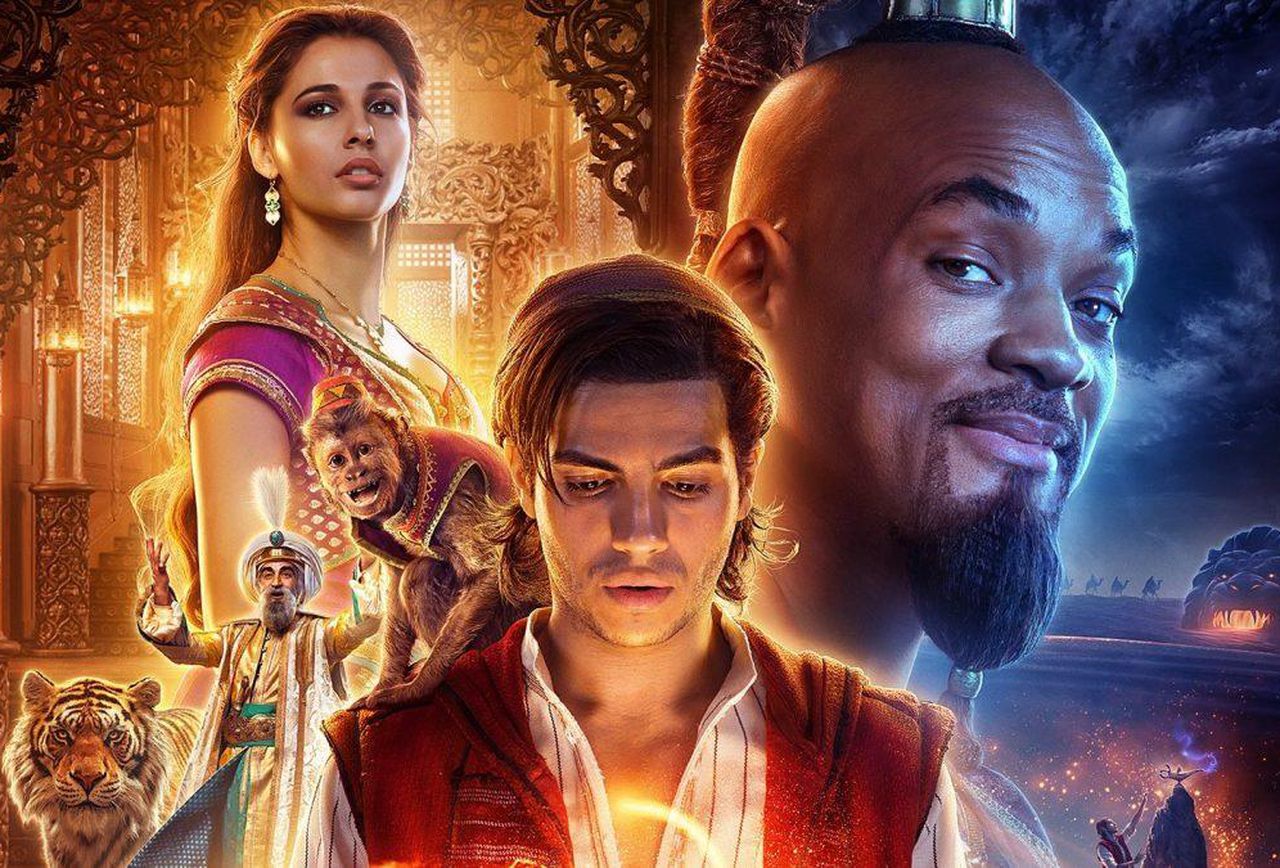Back in the 90’s, the Disney animation renaissance kickstarted by The Little Mermaid took the House of Mouse to an obsession with moving beyond the Western-friendly fairy tales that served as their animators’ former bread and butter, instead looking at popular myths and stories from other cultures across the world to adapt. This paradigm led to offerings like the Africa-focused The Lion King, the China-focused Mulan, the Greece-focused Hercules, and of course, one of Disney’s crown jewels of the era, the Arabian-inspired Aladdin. Originally adapted from one of the stories told within the Middle Eastern folktale collection, One Thousand and One Nights, Aladdin went on to become one of Disney’s most beloved classics, winning two Academy Awards for its soundtrack, spawning two direct-to-video sequels, and creating a legacy of characters that continue to resurface in other Disney media to this day!
Inevitably then, Disney’s initiative to remake many of their animated classics in live-action would quickly set Aladdin in its sights. Following this past March’s satisfactory, if not amazing live-action remake of Dumbo, Aladdin’s live-action remake is releasing as the main blockbuster draw for this year’s lucrative Memorial Day weekend, a release period that has consistently served as a particular favourite for the executives at Disney. Considering the beloved legacy of Aladdin, this release strategy will likely be a box office slam dunk as well, particularly considering how spectacular and exciting the original animated Aladdin is.
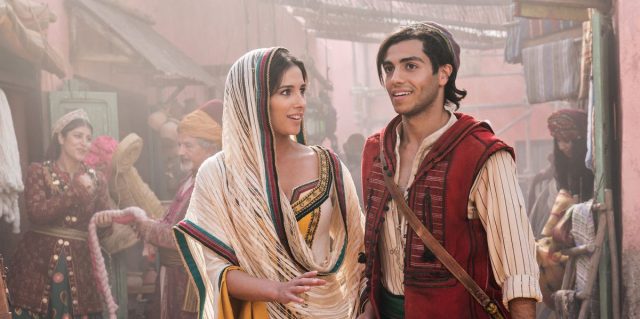
With that said however, it’s also true that Disney’s current crop of live-action remakes have often been shaky at best. Despite some genuinely fantastic hits like Cinderella, Pete’s Dragon and The Jungle Book, which have managed to rival and surpass their animated inspirations in many respects, there have also been some big misfires, like Maleficent and Alice in Wonderland, as well as some nice-looking, but ultimately unremarkable offerings like Beauty and the Beast, and the aforementioned Dumbo. Aladdin’s live-action remake fortunately does manage to avoid the bottom-level standard of Maleficent and Alice in Wonderland, but in terms of quality, it lands around the level of 2017’s Beauty and the Beast remake. It looks the part, and there are moments of it that are truly amazing to behold, but Aladdin’s live-action remake ultimately lacks the sheer novelty and spectacle behind the animated original, especially when some elements of that story inevitably don’t end up translating that well to live-action.
Even with some of the movie’s modern dialogue updates, the character arcs of Aladdin’s live-action remake remain straightforward, and true to their animated inspirations. Egyptian-Canadian up-and-coming actor, Mena Massoud headlines the Aladdin remake as the titular character, an orphaned young adult street urchin and thief, who resents consistently being dismissed as a mere, “Street rat.” Aladdin’s life is set to change however when he has a chance encounter with the princess of his home kingdom of Agrabah, Jasmine, played in the remake by Power Rangers’ Naomi Scott. This chance encounter leads to Aladdin’s and Jasmine’s disparate degrees of economic and political status clashing, changing both of their lives, right as Aladdin becomes part of a ploy by the kingdom’s vizier, Jafar, played in the remake by Marwan Kenzari, who conspires to seize the throne of Agrabah for himself.
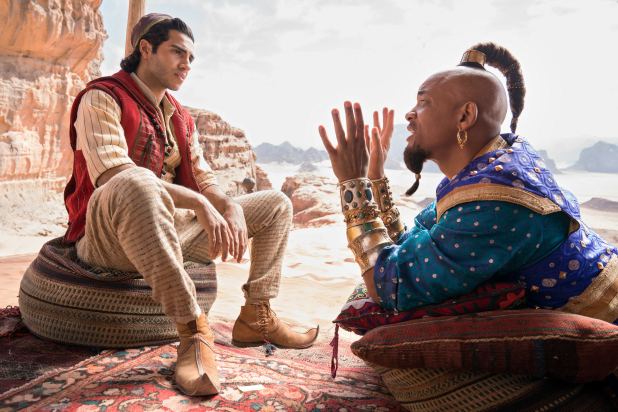
These are more or less the same character storylines from the original animated version of Aladdin, with Aladdin himself most notably left entirely untouched from the original movie when it comes to his character progression. Jasmine and Jafar meanwhile have seen some character additions in Aladdin’s live-action remake, with Jasmine now desiring to rule the kingdom herself and not simply marry a prince, which is more her father, the Sultan’s idea in this case. Jafar, meanwhile, is now motivated by the Sultan’s supposed inaction with his kingdom’s political resources, believing that Agrabah should expand territory and fortify its position in the ever-changing world, something that the Sultan is resistant to do. This is an interesting attempt to humanize and flesh out Jafar’s character, but frankly, Jafar is already a pretty great villain without the attempt to ground him. In the end, live-action Jafar’s ambitions amount to the same mere power lust from the original animated movie anyway, which audiences can no doubt predict. This results in Aladdin’s villain sadly becoming one of the remake’s most frustrating weak links, particularly when Kenzari seems to struggle to make Jafar effectively imposing here, considering how inconsistently the character is written and directed in Aladdin’s live-action remake.
Surprisingly, despite the initial backlash behind his appearance and portrayal of the late Robin Williams’ iconic Genie character from the Aladdin remake’s initial trailers, Will Smith ends up being a highlight as Genie in this remake. Smith is a little more sophisticated and a little less child-like than Williams’ animated take on the character, but he effectively makes Genie his own, evolving the character into a more charismatic and charming victim of circumstance, with less emphasis on being hyperactive and stretching the animation. This actually proves to be a good choice as well, since the Aladdin remake adds in a love interest for Genie, in the form of Jasmine’s head handmaiden Dalia, played by Nasim Pedrad, a character that didn’t exist in any form in the original animated movie. Pedrad thankfully ends up being another highlight to boot, owning many of the Aladdin remake’s most amusing moments, and boasting pretty impeccable chemistry with Smith.
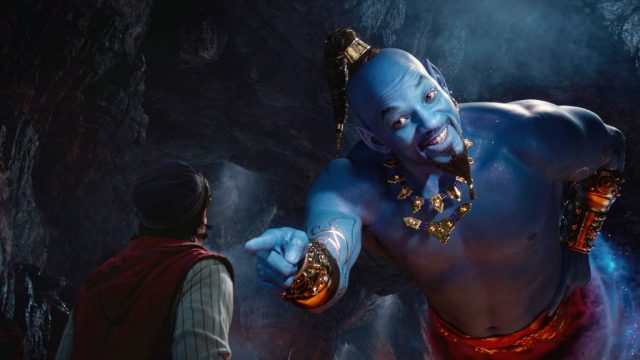
It was initially believed that Aladdin’s live-action remake would be ditching its animal personalities as well, akin to 2015’s slightly more grounded Cinderella remake, though fortunately, they’re present and accounted for. Frank Welker reprises his voiceover role in the remake as Aladdin’s monkey companion, Abu, Jasmine’s pet tiger, Rajah, and the booming, imposing voice behind the Cave of Wonders, all roles he also played in the animated original. Alan Tudyk also takes over the voice of Jafar’s conniving pet parrot, Iago, now portrayed with more realistic parrot-style speech, wherein all of his lines are spoken in sinister one-to-two-word sentences. The animals still end up meshing pretty well with the story too, despite only Iago ‘speaking’, and all of them end up serving as great comic relief, and surprisingly lovable personalities in their own right. Through personalities like these, a good chunk of the charm from the animated original does shine through in the remake, though this will probably just make you wish that the especially solid performances of Massoud, Scott, Smith and Pedrad were given a little more storytelling meat to work with.
Aladdin sticks pretty closely to the key story beats of its animated inspiration, sometimes following it to a fault. This remake does add a few small twists on the storytelling though, mostly with new characters like Dalia, but also with a few re-tooled sequences, and some all-new character dialogue. Truth be told, Aladdin’s live-action remake can often be at its best when it’s just having fun with its characters and dialogue as well. Some of the new character moments, particularly those in Agrabah’s palace, add some decent doses of drama, and some surprisingly funny bouts of humour. It’s just too bad that the Aladdin remake’s handful of surprises don’t ultimately manage to truly sweep audiences off of their feet, since they’re just not enough to extensively elevate yet another live-action Disney remake that too often struggles to outpace the imagination and inspiration behind the storytelling of its animated original.
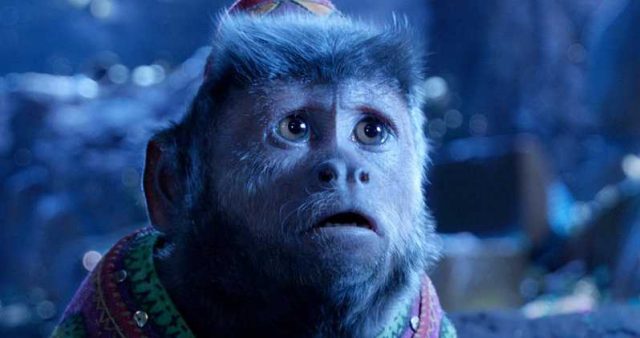
Arguably the biggest change to the storyline in the Aladdin remake is the effort to modernize Jasmine by making her aspire to rule Agrabah herself, as the kingdom’s first-ever female Sultan, rather than once again motivating her with the desire to fall in love, something that she seemingly couldn’t care less about in the remake. While I’m sure that many progressive parents and adults in general will no doubt appreciate Disney continuing to challenge the classic image of their Disney princesses, even Jasmine’s upgrade in character ambition doesn’t ultimately manage to extensively shift the core story progression that Aladdin already pretty much perfected in animated form back in 1992. As much as Aladdin’s live-action remake makes some clear efforts to modernize itself for the more sophisticated moviegoing audience of 2019, it still feels like Disney is tying one hand behind their back when it comes to re-imagining their classic stories for the modern era. Nostalgia is well and good, but when Disney’s animated classics are still so easily available to consume, and still stand the test of time so perfectly, this only continues to beg the question as to why Disney is bothering to remake so many of their animated hits (outside of the easy pay day), if they’re always going to play it so safe with their storytelling.
Among some of the curious choices that Disney has sometimes appointed to helm their live-action remakes, Guy Ritchie potentially stands as the most curious among them to date. Ritchie has a mixed reputation in the realm of genre blockbusters, managing a duology of pretty enjoyable Sherlock Holmes movies, though also fumbling King Arthur: Legend of the Sword. Aladdin would in turn seem to be especially out of left field for Ritchie at first glance, despite some possible appeal with designing a movie around a supposed criminal that eventually finds his place in society. Even more curious is Ritchie ever wanting to work with Disney in the first place, since the family-friendly studio would seem to stand in stark contrast to Ritchie’s usual love of snarky, irreverent humour, and gritty, pulp-flavoured character examination.
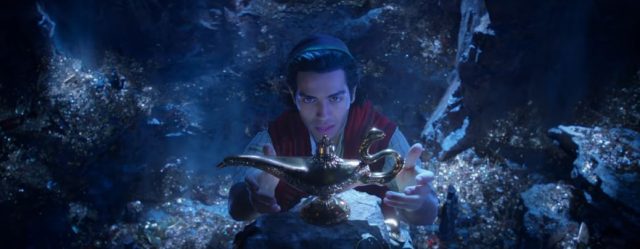
Ritchie’s hiring for Aladdin is indeed a mystery, but it is also true that the House of Mouse has managed to make some pretty unorthodox director choices end up delivering some truly excellent, especially novel movies. In this case however, Ritchie’s direction proves to be annoyingly uneven. There are times where it really works, especially when Ritchie displays a surprising aptitude for working within Disney’s family-friendly humour mandates, where he realizes scenes that maintain his clear love of character sarcasm and snark, which manage to elicit genuine laughs that are equally friendly for both children and adults. It also helps that Ritchie is working from his own script as well, which he co-wrote with John August, granting Ritchie some tightened control over how the characters deliver their lines, and how the set pieces can be structured around maximizing some genuinely hilarious humour.
When Ritchie’s direction doesn’t work though, it really doesn’t work. One temptation that Ritchie doesn’t manage to avoid in Aladdin’s live-action remake is his ever-present love of artful slowdown and framerate shifting. It’s a very poor fit for a movie like this, which sometimes has scenes randomly sped up, slowed down or halted, with seemingly no rhyme or reason. Moreover, a few of this remake’s scene framing efforts seem weirdly devoid of imagination, despite other sequences capitalizing on the live-action treatment very well, and delivering especially ambitious stunt work and staging choreography that’s positively dazzling to witness. You can certainly tell which scenes Ritchie was actively interested in adapting, and which scenes he was begrudgingly working through, which sadly leaves Aladdin’s live-action remake feeling more uneven in its execution than its more universally excellent animated inspiration.
If there’s one element of Aladdin that universally crushes it, easily keeping pace with the animated original in practically every respect, it’s the soundtrack. Aladdin’s live-action remake impressively maintains every key song from the original animated movie in some shape or form, while also contributing an all-new original song for Naomi Scott to perform, “Speechless.” This may be unsurprising, considering that the original animated Aladdin’s composer, Alan Menken was brought in to once again oversee the soundtrack of the live-action remake. This is definitely a smart choice too, considering that Menken’s work on the original animated movie won two Academy Awards, and fortunately, Menken’s magic touch feels mostly maintained in this remake.

Disney’s live-action remakes have sometimes been a little dodgy with their animated inspirations’ musical leanings, either only adopting certain fan-favourite songs, like The Jungle Book, or, a seemingly more popular option, excising the musical elements entirely. Like Beauty and the Beast’s live-action remake however, Aladdin maintains every pivotal musical number in the original animated movie’s soundtrack to some degree, now performed by the new cast, with some new lyrics swapped in for good measure. This of course includes fan-favourites such as, “Friend Like Me”, “Prince Ali” and, of course, the Oscar winning song, “A Whole New World.” Some of these songs have better vocal performances than sequences behind them, with, “A Whole New World” most notably feeling frustratingly drab in terms of how it’s shot, but, “Prince Ali” and, “Friend Like Me” in particular are so breathtakingly shot and performed that they positively leap off of the screen! “Speechless”, the all-new song, also doesn’t feel that well-staged or exciting to watch, but Naomi Scott at least excels with the song’s vocals, making the song itself great to listen to, even if the movie does disappointingly little with it.
The rest of the instrumental score in Aladdin’s live-action remake is also pretty outstanding overall, with re-tooled instrumental compositions from the fan-favourite musical numbers often working their way into sweeping, energetic score sections to superb effect. There’s definitely a potent sense of Disney magic throughout Aladdin, even during its less effective moments, with the soundtrack sometimes working overtime during the moments that struggle to keep pace with some of their superior portrayals in the animated original. If nothing else though, this is one of the best soundtracks that any live-action remake from Disney has managed to deliver to date, one that actually does manage to perfectly maintain the infectious charm and wondrous spectacle behind the original animated Aladdin’s audio selection.
Even Disney’s worst live-action remakes have at least consistently boasted gorgeous visual design, and that certainly holds true of Aladdin’s live-action remake as well. This is a gorgeously-produced movie, one with truly exceptional costume design and set pieces. The physical location and wardrobe work effortlessly brings the world of the animated original to wonderful live-action life, even with some costume changes in the remake’s character aesthetic. The lead character costumes are the most blatantly updated visual element of the Aladdin remake, with Will Smith’s genie adhering closest to his animated counterpart whenever he’s in his natural blue-hued state (Smith’s likeness is the only real difference), though Aladdin’s and Jasmine’s outfits have both been altered to be both more colourful and more conservative. Jafar, meanwhile, appears to have had a shadier outfit put together in contrast to his animated inspiration, likely to better differentiate him as a villainous character in this fantastical Middle East-inspired setting.
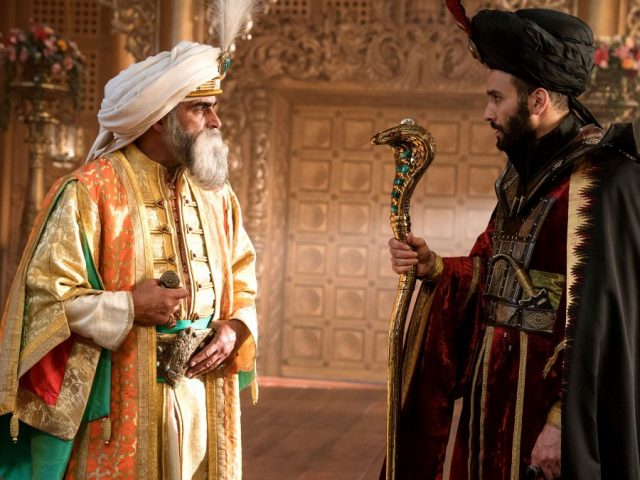
Aladdin’s commitment to handmade stunt work is also impressive, with Aladdin himself often flexing some pretty incredible agility and acrobatics at several points during the movie. There is however still quite a lot of CGI involved with certain characters, with Genie often embodying most of it. Genie’s live-action look has been touched up a bit from the initial trailers, along with some of his admittedly colourful and very entertaining magical effects, though it’s nonetheless true that the hand-drawn Robin Williams incarnation definitely looked and animated a lot better, even if it’s also true that Williams’ take on Genie was bound to be an impossible act to follow. The magic carpet is also CGI-rendered, as expected, along with animal characters, Abu, Rajah and Iago, who all look perfectly convincing in the live-action setting, which should be unsurprising after Disney’s incredible animal CGI work in their live-action remake of The Jungle Book. Finally, CGI-driven set pieces like those in the Cave of Wonders also manage to look pretty great, if noticeably more understated with their action-driven effects than they were in the animated original.
Regrettably, the early screening of Aladdin I attended was not in 3D, so I can’t comment on the movie’s 3D effects. Guy Ritchie’s love of random slowdown and speedup framing will probably make the 3D cut a tricky proposition for those susceptible to motion sickness, though thankfully, many of Aladdin’s scenes seem put together to function perfectly well when viewed flat in 2D. I was at least able to experience my screening in an IMAX theatre as well, which does nicely enhance the movie’s scale, and helps make its detailed sets leap to life with even more immersion. Upgrading to IMAX doesn’t feel all that essential in this case, but if you’re so inclined, you’ll see a modest upgrade to some of the more impressive, sweeping shots, and some of the more exciting action sequences. Thus, if you have the option, and don’t mind spending the few extra dollars for an IMAX ticket, you might as well spring for the upgrade, even if Aladdin is still pretty stunning to look at in a conventional digital theatre, with or without 3D glasses.
Aladdin ultimately manages to land on the side of being one of the better live-action Disney remakes, but it still ends up noticeably trailing its animated inspiration. The audio and visual design of the remake are truly fantastic, as with any of Disney’s live-action remakes made to date, and despite their simplistic story arcs that don’t end up charting much new territory from the animated original, the frequently amusing sense of humour and wit behind the remake’s characters makes them entertaining to watch and listen to in their live-action incarnations. As far as capturing the spirit and charm of Aladdin in a live-action rendition, this remake hits more often than it misses, and should delight both established fans of the animated original, as well as newcomers discovering this story for the first time, regardless of their age.
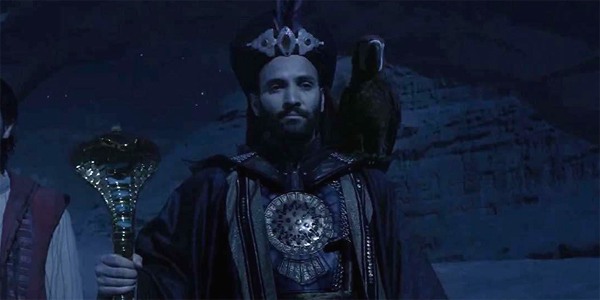
Therein lies the rub though– The original animated version of Aladdin still clearly realized this story better, and the efforts to modernize the tale of Aladdin for moviegoers of 2019 ultimately feel too feeble and undercooked to truly make the remake stand out, beyond the gimmick of how good it looks and sounds in live-action. This unfortunately leaves Aladdin’s live-action remake struggling to break free from the shadow of its animated inspiration, a problem that has almost universally dragged down Disney’s live-action remake efforts up to this point. You’re definitely getting a solid effort here, but also an effort that still too frequently feels like an imitation of a better movie, rather than a truly bold and invigorating re-imagining for the modern era.

